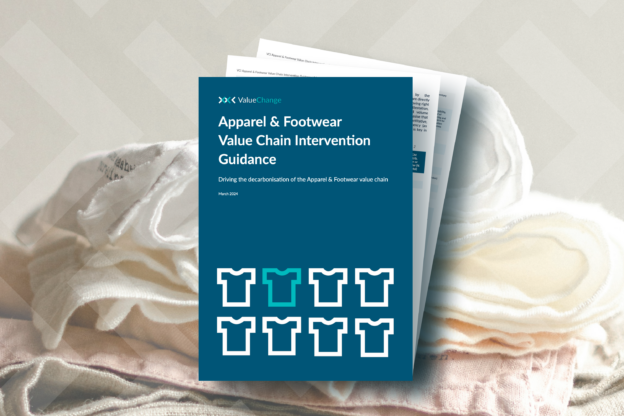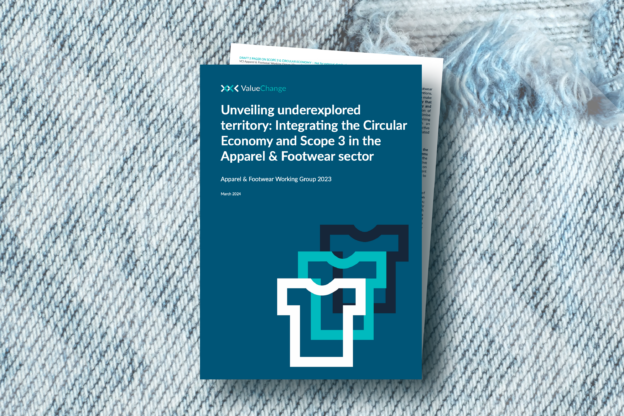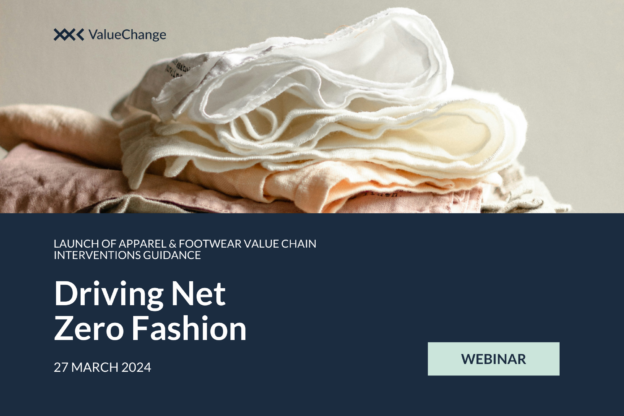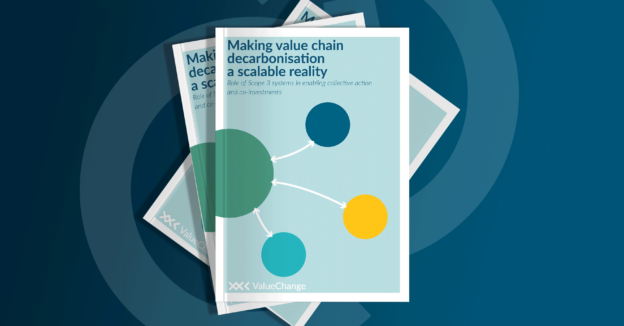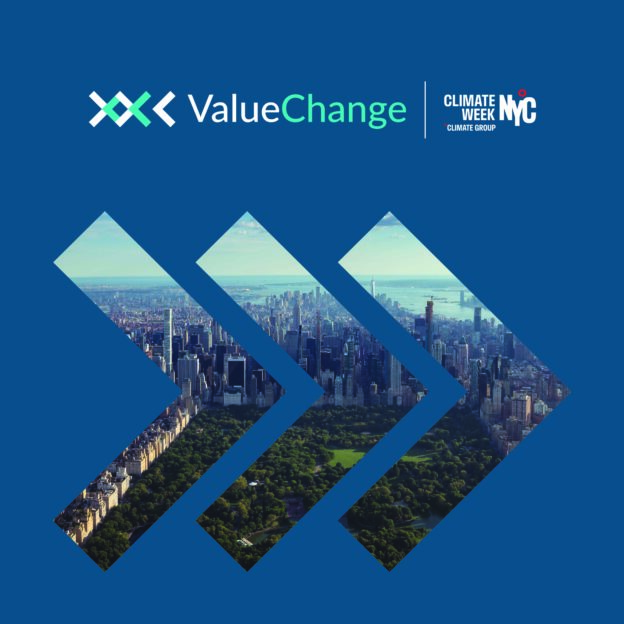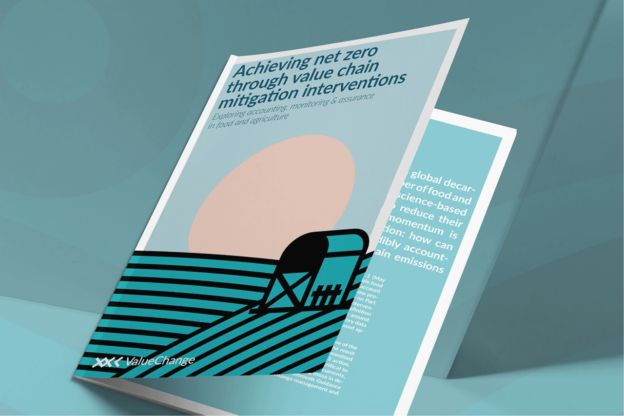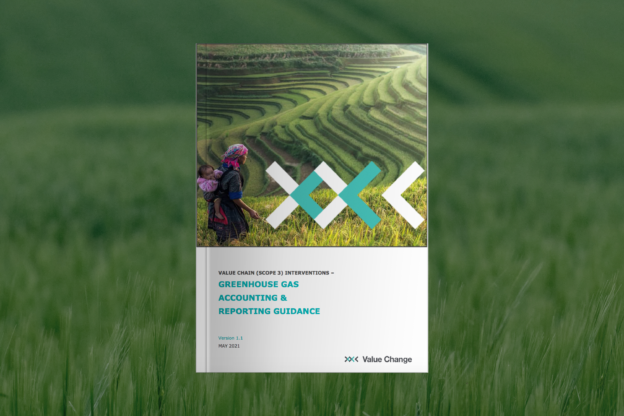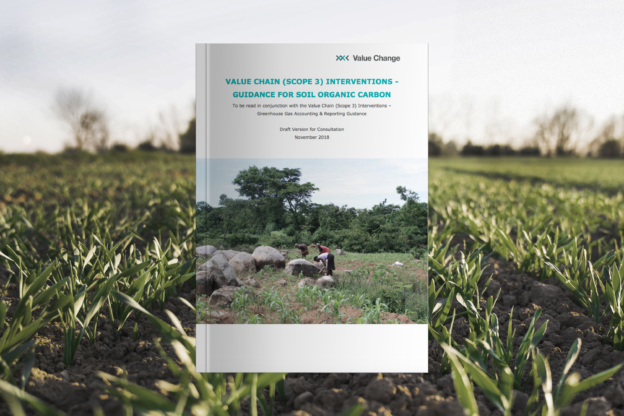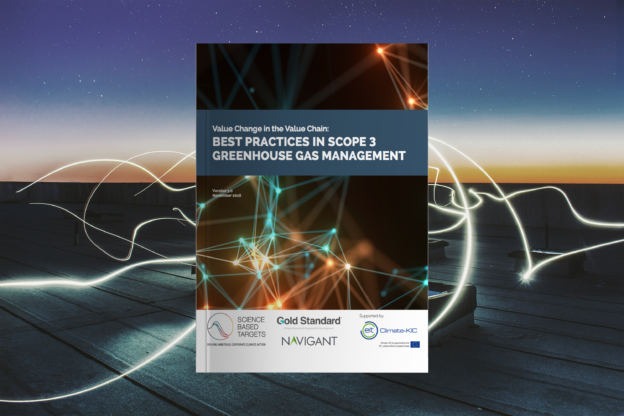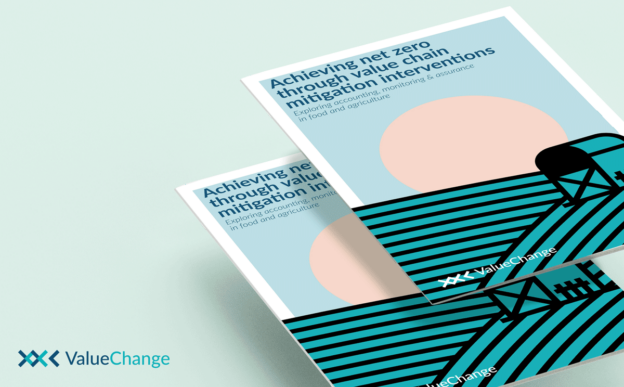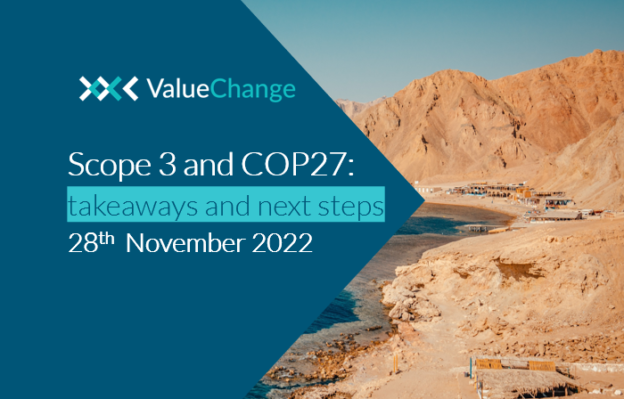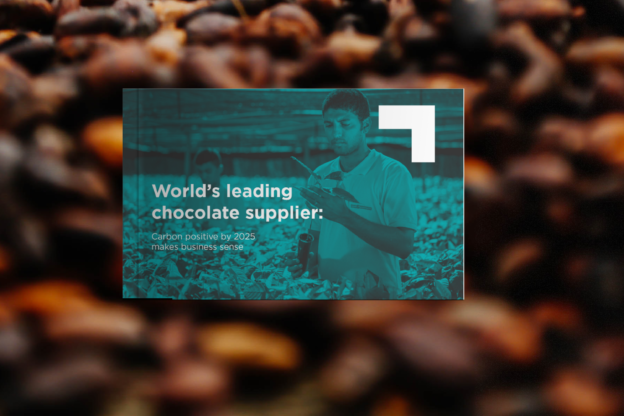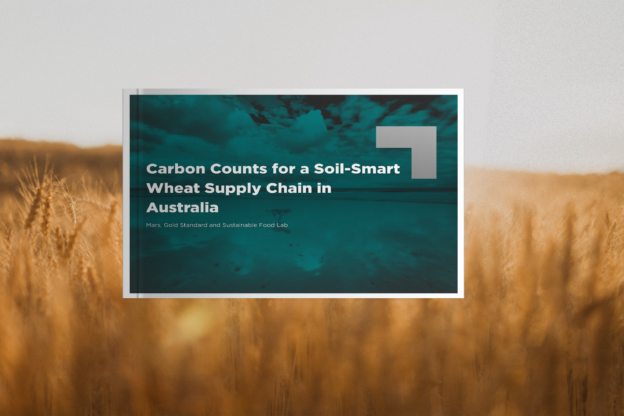-
Apparel & Footwear Value Chain Intervention Guidance
The Apparel and Footwear sector faces pressure to address climate change, with complex value chains posing challenges. This guidance document, co-developed by 32 organisations, offers a pioneering framework focused on Scope 3 emissions to streamline decarbonisation efforts and foster collaboration towards a net-zero industry. -
Unveiling Underexplored Territory – Integrating the Circular Economy and Scope 3 in the Apparel & Footwear Sector
The relationship between Circular Economy and Scope 3 greenhouse gas (GHG) emissions in the Apparel and Footwear sector is underexplored but critical for decarbonising value chains. This document outlines challenges and opportunities, emphasising the need for collaborative efforts to overcome barriers and transition towards sustainability, aligning industry practices with evolving standards.
-
Driving Net Zero Fashion Webinar Recording
Launch of Apparel & Footwear Value Chain Interventions Guidance
As the climate emergency intensifies, so does the urgency for private sector action towards achieving Net Zero emissions. With impending regulations looming, such as the California Climate Corporate Data Accountability Act and the EU's Ecodesign for Sustainable Products, the Apparel & Footwear sector stands at a critical juncture.
Our panel of experts from Adidas, Textile Exchange, the Apparel Climate Institute and Bestseller discussed how to achieve apparel value chain decarbonisation with a focus on emission reductions and interventions’ implementation, claiming and reporting.
-
Making value chain decarbonisation a scalable reality: Role of Scope 3 systems in enabling collective action and co-investment
This document presents the output of the Systems Lab organised by the Value Change Initiative (VCI) in 2022. Thirty-one organisations across diverse sectors discussed and explored the key concepts to underpin a “system of systems” that would allow effective value chain accounting.
-
Net Zero value chains: Enabling collaboration to unlock value chain decarbonisation at scale – September 2023 – Recording
During Climate Week’s premier Scope 3 event, together with leading experts and companies, we explored and discussed solutions to accelerate action when traceability is imperfect, enable collaboration and partnerships, and make Net Zero value chains a reality in today’s Scope 3 landscape.
Streamed on 20th September 2023 as part of the Value Change Initiative open event at Climate Week NYC.
-
Net Zero value chains – September 2023 – Breakout session Food and Agriculture value chain interventions Recording
During Climate Week’s premier Scope 3 event, together with leading experts and companies, we explored and discussed solutions to accelerate action when traceability is imperfect, enable collaboration and partnerships, and make Net Zero value chains a reality in today’s Scope 3 landscape.
Recorded on 20th September 2023 as part of the Value Change Initiative open event at Climate Week NYC.
-
Net Zero value chains – September 2023 – Breakout session Apparel value chain interventions Recording
During Climate Week’s premier Scope 3 event, together with leading experts and companies, we explored and discussed solutions to accelerate action when traceability is imperfect, enable collaboration and partnerships, and make Net Zero value chains a reality in today’s Scope 3 landscape.
Recorded on 20th September 2023 as part of the Value Change Initiative open event at Climate Week NYC.
-
Achieving Net Zero Through Value Chain Mitigation Interventions: Exploring Accounting, Monitoring & Assurance in Food and Agriculture
Introduced as an addendum to the Value Change Intervention Guidance 1.1, this document is an in-depth technical extension which aims to provide food and agricultural companies with operational, sector-specific solutions to account for an Intervention, report impact up and down their value chains, and show progress towards their climate commitments or science-based targets.
-
Value Chain Interventions Guidance: Ensuring Intervention Level Emission Reductions Are Recognised by Accounting Protocols
The Value Chain Interventions Guidance enables credible reporting for actions that reduce emissions and contribute toward performance targets, in line with common accounting frameworks such as the GHG Protocol.
-
Accounting & Reporting the Emissions of Certified Commodities
This Guidance provides sustainability systems with approaches to align their commodity certification with greenhouse gas emission reporting good practices.
-
Guidance for Soil Organic Carbon (SOC)
Demonstrates how to quantify carbon sequestered in soil and is aimed at companies with Scope 3 reduction targets that seek to account for interventions that impact total net Soil Organic Carbon (SOC) associated with purchased goods & services.
-
Value Change in the Value Chain: Best Practices in Scope 3 Greenhouse Gas Management
To support companies committed to addressing the climate impact of their value chains, this guidance document summarizes the latest best practices in reducing scope 3 GHG emissions by describing different emissions reduction levers companies can employ.
-
Scope 3 and COP 27: takeaways and next steps – November 2022 – Recording
With COP27 comes a growing recognition that the time for accelerating climate action is now, building on the ambitions set, and implementing pathways to a low carbon future. Many businesses are leading the way, with over one fifth of the world’s largest publicly-listed companies having already pledged Net-Zero commitments by 2050, and making critical steps towards meeting these targets. Scope 3 sources represent on average 75% of an organization’s carbon footprint, making action in Scope 3 vital to meet these ambitions and a Net-Zero world. In many cases Scope 3 emissions are also the most difficult to measure, track and manage; requiring new innovations, partnerships and solutions to tackle these complex challenges. In this one-hour webinar, the Value Change Initiative brings together leading experts and organizations to share reflections on COP27 through the lens of Scope 3 action.
-
Net Zero Value Chains: from commitment to credible reporting – September 2022 – Recording
In the transition towards a climate resilient society, bolder commitments, scaled actions and accurate business reporting are key for success. With over 1100 companies committed to reaching net-zero GHG emissions by 2050, answering questions on how Scope 3 or value chain emissions reductions can be achieved and credibly reported is an absolute priority. Join us, together with leading experts and companies, to learn and explore how we can move from ambition to action, drive transparent and reliable Scope 3 data, and achieve Net Zero Value Chains.
Streamed on 21st September 2022 as part of the Value Change Initiative open event at Climate Week NYC.
-
Valuing Low Carbon Commodities – June 2022 – Recording
This one-hour webinar launched “Accounting + Reporting the Climate Impact of Certified Commodities” Guidance, which establishes the foundation for realizing added value for low-carbon commodities.
-
VCI Summit: Making Net-Zero Value Chains Possible – November 2021 – Recording
Making net-zero value chains possible was a free global conference bringing together climate world pioneers and forward-thinking leaders, at forefront of value chain decarbonization, coming together to inspire and challenge each other, identify barriers and find solutions to unlock Scope 3 impact at scale and accelerate local and global action to achieve net zero value chains.
-
Case Study – Carbon Positive by 2025 Makes Business Sense
Barry Callebaut’s ‘Forever Chocolate’ programme plans to make sustainable chocolate the norm by 2025. See how the world’s leading chocolate supplier is helping to ensure future supplies of cocoa, providing measurable climate benefits and improving productivity and farmer livelihoods.
-
Case Study – Carbon Counts for a Soil-Smart Wheat Supply Chain in Australia
Mars, Gold Standard and Sustainable Food Lab are helping Australian farmers measure and reduce net GHG emissions from wheat. See how this initiative improved soil health and resilience to weather shocks, produced higher yields and reduced net GHG emissions.


